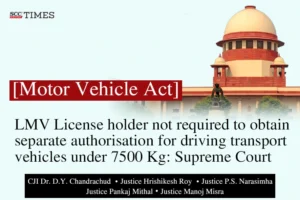Supreme Court: In a matter concerning the issue that whether a person holding a driving license in respect of a ‘light motor vehicle’ (LMV), could on the strength of that license, be entitled to drive a ‘transport vehicle of light motor vehicle class’ having unladen weight not exceeding 7500 kg, the 5-Judge Bench comprising of Dr. DY Chandrachud, CJI, Hrishikesh Roy*, PS Narasimha, Pankaj Mithal, and Manoj Misra, JJ. held that a person holding a driving license for a LMV can, without any specific endorsement, drive a transport vehicle having an unladen weight of less than 7500 kg.
The issue at hand originated in the case of Mukund Dewangan v. Oriental Insurance Company Limited (2017) 14 SCC 663, where a 3-judge bench ruled that no separate endorsement was needed on an LMV driving license to operate a transport vehicle with an unladen weight below 7500 kg. The Court held that a person with an LMV license could drive a “transport vehicle of light motor vehicle class” weighing up to 7500 kg. However, in 2022, a coordinate bench raised doubts about this ruling, and the matter was subsequently referred to a larger 5-judge bench for further consideration.
Adopting a harmonious interpretation of the provisions of the Motor Vehicles Act, 1988 (‘MV Act’), the Court upheld the decision in Mukund Dewangan (supra).
The Court gave the following conclusions:
- A driver holding a license for LMV for vehicles underweight 7500 kg is permitted to operate a transport vehicle without needing additional authorisation under Section 10(2)(e) of the MV Act.
- For licensing purposes, LMVs and transport vehicles are not completely distinct categories, as there is some overlap between the two. A driver holding an LMV license can, under certain conditions, operate light commercial transport vehicles. However, there are still specific eligibility requirements that apply to certain types of vehicles, such as e-carts, e-rickshaws, and vehicles transporting hazardous goods.
- The second part of Section 3(1), which emphasises the necessity of a specific requirement to drive transport vehicle, does not supersede the definition of LMV provided in Section 2(21) of the MV Act.
-
The additional eligibility criteria specified in the MV Act and MV Rules generally for driving transport vehicles would apply only to those intending to operate transport vehicles exceeding 7500 kgs, i.e medium goods vehicle, medium passenger vehicle, heavy goods vehicle and heavy passenger vehicles.
Source: Supreme Court Live hearing

